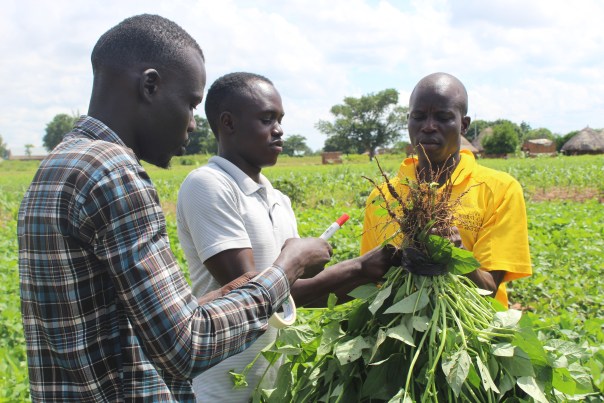
By Douglas Olum
Kumi is a district in Eastern Uganda. On average, it takes six hours by road to get there from the capital, Kampala. Like most parts of the country, Kumi is agro-based, but farming is largely done for survival only. Often farmers suffer from famine as pests and diseases destroy their crops. Sometimes, long droughts burn down the crops. The ultimate tragedy is starvation and death, including among children.
Odeke is a farmer in Olupet Village in Kumi Sub-County. While he was considered a commercial farmer in the village, Odeke said for a long time he was losing his crops to pests and diseases because he lacked the knowledge to control them.
Students from Uganda Christian University’s (UCU) department of Agricultural and Biological Sciences have been in Kumi District since May 2019 on an internship program targeted at contributing to innovations for sustainable rural development in Uganda. A team of six students was dispatched to three sub-counties, with a pair taking each sub-county under the program.

Olupet Village received Newton Kucel and Nelson Mandela, both of whom are third-year Bachelor of Agricultural Science and Entrepreneurship students. The pair that has spent at least three months in the community carried out needs assessment, held farm clinics where they helped and trained farmers to identify different pests and diseases, taught preventive and control measures, and also established demonstration farms from which they taught the farmers commercial vegetables production, piggery, poultry farming and record keeping.
Mandela said that at the time they went to the village, they discovered that the farmers were suffering despite investing so much effort in their farms. He said crops were dying in the gardens out of treatable causes and even the little that the farmers could harvest would not help much because the farmers lacked ideas on how to market their products. And because of that, they designed measures to address those specific challenges.
Odeke said the students’ measures have helped them to manage and control various pests and diseases, improve their crop yields by making and using organic manure, cut their costs of production and also see new opportunities in poultry and piggery. He said they also learned to study the eating patterns of various pests, when to spray their crops and what quantity of pesticides to use. These were areas in which the farmers had no prior knowledge.
“To be sincere, these students have helped not only our group but the entire community,” Odeke said. “People have been calling me and flocking to my home from as far as five kilometers (3 miles away) to attend the farm clinics.”
The local farmers credit UCU for helping them.
“I am really so thankful to the students, their lecturers and the university for thinking about us,” Odeke said. “I feel indebted that you people are offering us a very important service for free yet we should have paid you. I am going to use the knowledge you have given us to teach my children and other farmers.”
At the time of this visit, the farmers were already harvesting sorghum and cow peas. The students were helping them to manage the post-harvest processes to control possible waste. They also were connecting with markets outside the region to establish competent prices for various products in order to save the farmers from exploitation by middle men.
Odeke said they were able to get a good yield of the two crops due to the encouragement of the students. They are integrating sorghum with cow peas to control pod-suckers, a kind of pest that had bothered them and caused them so much loss in terms of yield for a very long time.
Ms. Ruth Buteme, a lecturer at the department who also doubled as the coordinator and students’ supervisor under the program, said the testimonies were quite encouraging and showed the need to carry more of such extension services to more villages and also other parts of the country.
“I am happy that the students were able to solve some problems here,” she said. “The world needs problem solvers. We are hoping that we can continue bringing more students here and also take them elsewhere in order to help our country develop. Uganda has to develop. And there is no way we are going to realize the desired development without involving the common man in the villages.”
In line with UCU’s vision to become a Centre of Excellence in the heart of Africa, Buteme said the department targets to become a Centre of Excellence in vegetable research to help combat silent hunger in Uganda.
*************************************************
To support UCU students, programs and facilities, go to www.ugandapartners.org and click on the “donate” button or contact UCU Partners Executive Director, Mark Bartels, at mtbartels@gmail.com.

